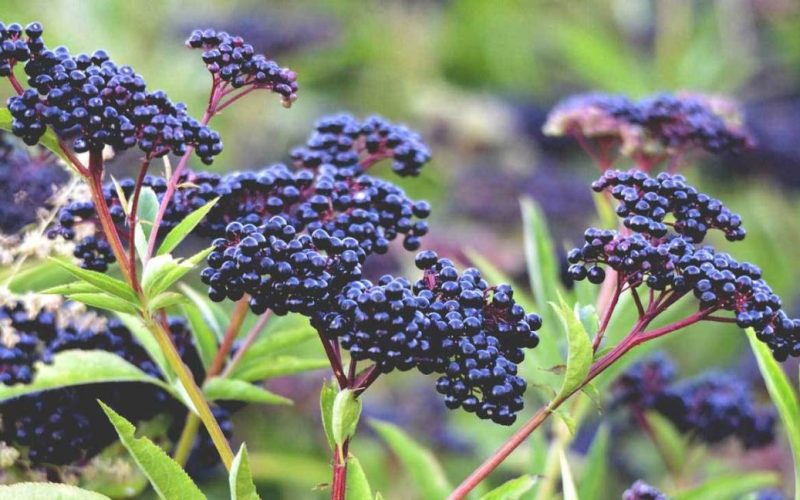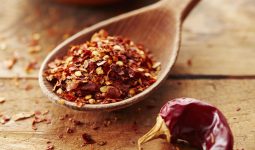Elderberry is one of the most frequently used medicinal plants in the world. It is several of different varieties of Sambucus tree, which belongs to the Adoxaceae family.
Generally, the plant is used by Native Americans to treat infections. It’s was also used by ancient Egyptians to heal burns and improve their complexions. Elderberry is currently used today to treat symptoms of cold and flu.
While elderberry is used to improve health, the bark, leaves, and raw berries of the plant are considered poisonous and can lead to stomach problems. Read on to find out more about the benefits and the dangers of elderberry.
Benefits of Elderberry
There are several benefits of elderberries. They are not only nutritious, but they are also used to fight cold and flu-like symptoms. Elderberry can be taken to fight inflammation and support heart health.
They are also used to fight infections, among many other benefits.
High in Nutrients
About 100 grams of elderberries contain 73 calories, less than 1 gram of fat and protein, and 18.4 grams of carbs. Elderberries are also considered to be packed with antioxidants. Other benefits of the berries include:
- High in dietary fiber: There are about 7 grams of fiber contained in 100 grams of fresh elderberries. This is over one-quarter of the authorized daily intake.
- Rich in vitamin C: There is 6 to 35 mg of vitamin C/100 grams of elderberry fruit, and this accounts for up to 60 percent of the recommended daily intake.
- Good source of flavonols: This berry contains antioxidant flavonols quercetin, isorhamnetin and kaempferol. The flowers that the plant produces provides ten times more flavonols than the berry.
- Good source of phenolic acids: These compounds contain potent antioxidants that can help minimize damage from oxidative strain in the body.
- Good source of anthocyanins: Anthocyanins give the fruit it’s dark-purple color. It’s also a good antioxidant.
The precise nutritional configuration of elderberries depends on the type of plant, climatic and environmental conditions, and ripeness of the berries. Because of this, servings can differ in their nutrition.
Improve symptoms of cold and flu
It’s been known that extracts from black elderberry and flower infusions help to reduce the length and severity of influenza.
The commercial preparation of the berry used for the treatment of colds is made in various forms, such as capsules, liquid, gummies, and lozenges.
A study of 60 individuals with influenza showed signs of improvement in 2-4 days in people who took 15 ml of elderberry extract four times per day, whereas it took the control group 7-8 days to improve.
Elderberry extract has also shown to significantly enhance flu symptoms, including headache, fever, nasal congestion, and muscle ache in just 24 hours.
High in Antioxidants
During metabolism, there may be a release of reactive molecules that can accumulate in the body. This can lead to oxidative stress causing the development of diseases like cancer and type 2 diabetes.
The fruits, flowers, and leaves of the elderberry plant are good sources of antioxidants that help to reduce levels of reactive molecules. Anthocyanins present in elderberries have to 3 times the antioxidant strength of vitamin E.
A study analyzing 15 different types of berries and other studies examining types of wine discovered that elderberry is one of the most potent antioxidants.
Although elderberry has displayed promising results in the lab, research in animals and humans is still minimal. In general, adding it to your diet plays a small role in changing antioxidants status.
The process of extracting elderberry juice, such as extraction, juicing, or heating, can minimize the antioxidant activity. Products like teas, syrups, jams, and juices may have decreased benefits when compared to some of the results seen in lab studies.
Can help improve Heart Health
Elderberry may be eaten to positively affects the health of the heart and blood vessel. Elderberry juice can be taken to reduce fat present in the blood as well as minimize the level of cholesterol in the body.
Also, the presence of anthocyanins in elderberry has been proven to decrease the risk of heart disease, blood pressure, blood sugar levels, and levels of uric acid in the blood.
Despite these promising results, the direct decrease in heart attacks or other heart disease-related symptoms has not been demonstrated yet.
Other Health Benefits
There are several other reported benefits of elderberry, even though some of them have insufficient scientific evidence:
- Fights harmful bacteria: It’s been discovered that elderberries can inhibit the growth of bacteria, such as Helicobacter pylori, which may invariably improve symptoms of bronchitis and sinusitis and bronchitis.
- Helps fight cancer: Both American and European elderberries have been noticed to have some cancer-inhibiting constituents in test-tube studies.
- May increase urination: Lab tests showed that elderberry flowers increased the amount of salt expelling and frequency of urination in rats.
- May boost the immune system: Polyphenols present in elderberries were found to increase immune defense in rats by maximizing the number of white blood cells.
- Protect against UV radiation: Skin product containing extract from elderberry was found to SPF (sun protection factor) of 9.88.
- Antidepressant properties: A study found mice fed with elderberry extract per pound had improved performance and were more active.
While these are exciting results, further research in humans is required to help determine the effectiveness of elderberries.
It’s also vital to note that there is currently no standardized measurement for the bioactive compounds, such as Anthocyanins in commercial products.
Side effects and health risk
Although elderberry has several benefits, we also need to understand that there are also some side effects associated with the consumption of the plant.
The unripe berries, bark, and seeds have some amounts of substances referred to as lectins, which can lead to stomach complications if eaten in excess.
There are also substances in the plant known as cyanogenic glycosides. These compounds are able to release cyanide, which is very toxic.
Some symptoms associated with the consumption of uncooked berries, roots, bark, and leaves include vomiting, nausea, numbness, stupor, dizziness, and diarrhea.
Fortunately, commercially prepared and cooked elderberries don’t contain cyanide. Nevertheless, the plant leaves or bark shouldn’t be used in juicing or cooking.
Be sure to carefully identify the plant as European or American elderberry if you are collecting the berries or flowers yourself. This is because other types of plants may be very toxic. Also, ensure to have the plant leaves and bark removed before use.
Pregnant or lactating women shouldn’t take elderberry. It should also be kept away from children and adolescents below the age of 18 years. While there are no reports of threatening events in these groups, we still have minimal data to confirm its safety.
The Bottom Line
Although elderberry has been linked with many great health benefits, some of the research has only been carried out in lab settings, and no result has been recorded in humans. Thus, elderberry isn’t recommended for any specific health benefit.
Rational evidence supports the use of elderberry in reducing the severity and length of flu symptoms. It may also be used for its anti-inflammatory, antioxidants, anti-cancer, anti-diabetes properties, as well as improving heart health. It is also a good source of vitamin C and fiber.
Have you had elderberries before? What is the taste like? Did it improve your health in any way? Are there unfavorable effects of elderberries you’d like to share with us? Please use the comments section below.








